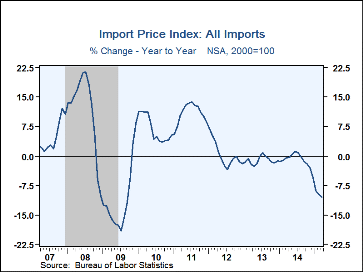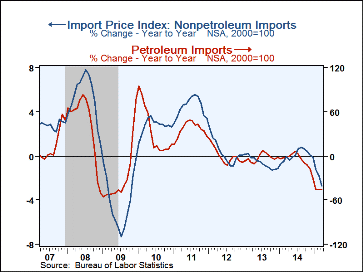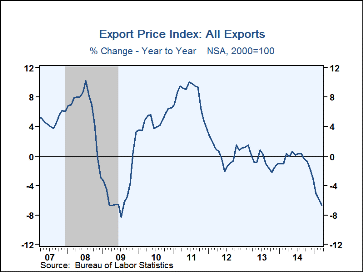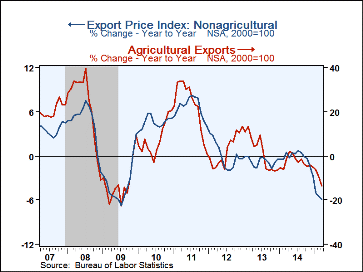 Global| Apr 10 2015
Global| Apr 10 2015U.S. Import Prices Move Lower Despite Higher Petroleum Prices
by:Tom Moeller
|in:Economy in Brief
Summary
Import prices declined 0.3% (-10.5% y/y) during March and reversed February's 0.2% increase, revised from 0.4%. The Action Economics Forecast Survey anticipated a 0.4% decline. Prices of petroleum imports increased 0.8% (-45.1% y/y) [...]
Import prices declined 0.3% (-10.5% y/y) during March and reversed February's 0.2% increase, revised from 0.4%. The Action Economics Forecast Survey anticipated a 0.4% decline.
Prices of petroleum imports increased 0.8% (-45.1% y/y) after a 5.2% rise. Nonpetroleum import prices were off 0.4% (-2.7% y/y). Industrial materials prices excluding petroleum continued downward, off 1.5% (-9.9% y/y), about the same as during the prior two months. Building materials prices declined 1.1% (-3.4% y/y). Prices amongst the other end-use categories also continued to fall. Food, feed & beverage prices declined 1.1% (-2.9% y/y) and autos & parts prices were off 0.3% (-1.8% y/y). Nonauto consumer goods prices also declined 0.3% (-0.6% y/y) while capital goods prices edged down 0.1% (-1.0% y/y).
Export prices also continued tame. Their 0.1% uptick (-6.7% y/y) was the first positive reading in eight months. A 0.2% decline had been expected. Agricultural export prices declined 1.7% (-13.5% y/y) while non-agricultural prices gained 0.2% (-5.9% y/y). Overall industrial materials & supplies prices increased 0.7% (-16.3% y/y), reflecting a 5.1% rise (-35.7% y/y) in petroleum prices. That was offset by a 1.2% decline (-12.2% y/y) in foods, feeds & beverage prices. Prices excluding foods and fuels edged 0.2% lower (-1.8% y/y), down for the seventh straight month. Capital goods export prices remained unchanged (0.7% y/y) although prices excluding computers & peripheral nudged up 0.1% (1.3% y/y). Nonauto consumer goods prices also were unchanged (-1.7% y/y) but autos & parts prices ticked 0.1% higher (0.4% y/y).
The import and export price series can be found in Haver's USECON database. Detailed figures, including the industrial materials excluding petroleum imports and the fuel & lubricant export items mentioned above, are available in the USINT database. The expectations figure from the Action Economics Forecast Survey is in the AS1REPNA database.
| Import/Export Prices (NSA, %) | Mar | Feb | Jan | Mar Y/Y | 2014 | 2013 | 2012 |
|---|---|---|---|---|---|---|---|
| Imports - All Commodities | -0.3 | 0.2 | -3.2 | -10.5 | -1.1 | -1.1 | 0.3 |
| Petroleum | 0.8 | 5.2 | -21.2 | -45.1 | -5.6 | -2.6 | -0.3 |
| Nonpetroleum | -0.4 | -0.3 | -0.7 | -2.7 | 0.1 | -0.6 | 0.3 |
| Exports - All Commodities | 0.1 | -0.2 | -1.8 | -6.7 | -0.5 | -0.4 | 0.4 |
| Agricultural | -1.7 | -2.1 | -1.3 | -13.5 | -2.7 | 1.6 | 2.4 |
| Nonagricultural | 0.2 | 0.1 | -1.9 | -5.9 | -0.3 | -0.7 | 0.1 |
Tom Moeller
AuthorMore in Author Profile »Prior to joining Haver Analytics in 2000, Mr. Moeller worked as the Economist at Chancellor Capital Management from 1985 to 1999. There, he developed comprehensive economic forecasts and interpreted economic data for equity and fixed income portfolio managers. Also at Chancellor, Mr. Moeller worked as an equity analyst and was responsible for researching and rating companies in the economically sensitive automobile and housing industries for investment in Chancellor’s equity portfolio. Prior to joining Chancellor, Mr. Moeller was an Economist at Citibank from 1979 to 1984. He also analyzed pricing behavior in the metals industry for the Council on Wage and Price Stability in Washington, D.C. In 1999, Mr. Moeller received the award for most accurate forecast from the Forecasters' Club of New York. From 1990 to 1992 he was President of the New York Association for Business Economists. Mr. Moeller earned an M.B.A. in Finance from Fordham University, where he graduated in 1987. He holds a Bachelor of Arts in Economics from George Washington University.
More Economy in Brief
 Global| Feb 05 2026
Global| Feb 05 2026Charts of the Week: Balanced Policy, Resilient Data and AI Narratives
by:Andrew Cates










